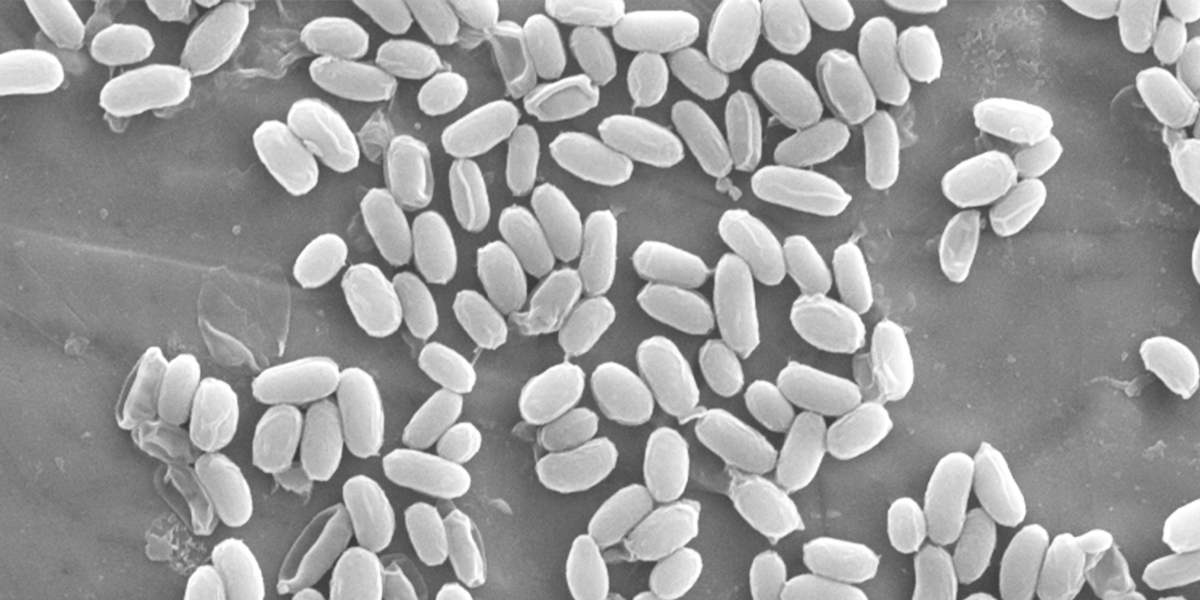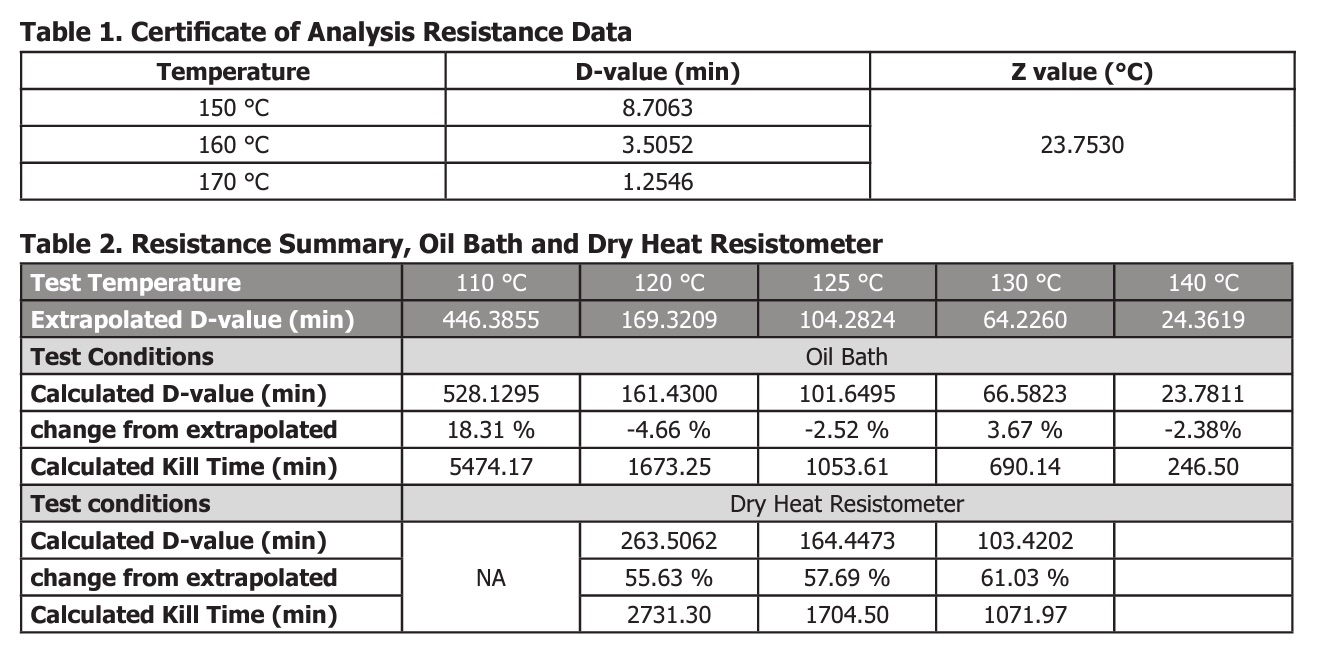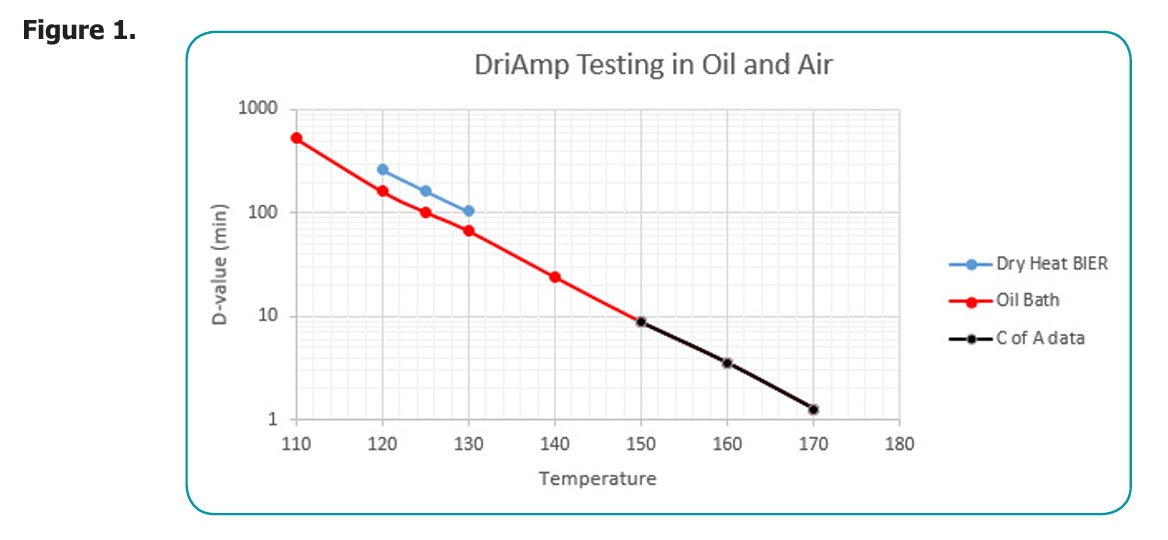VOL 12, ISSUE 4
Product Profile: DriAmp Biological Indicator

By Eric Gillitzer
DriAmp is a biological indicator (BI) designed for assaying dry heat cycles for sterilization efficacy. Unlike a paper spore strip, DriAmp contains a sand substrate inoculated with spores, then sealed within a 1.2 mL glass ampoule. One of the benefits of this configuration is the ability to monitor sterilization cycles having temperatures greater than 170 °C. At these higher temperatures, the paper strips start to degrade and can char or burn. DriAmp can also be used to monitor low temperature dry heat cycles where creams and oils are being sterilized. They can be suspended in the middle of a product-filled container being sterilized and not fall apart or release their contents into the load.
In this Spore News we look into using this product for low temperature sterilization of oils and creams. Typically, steam sterilization isn’t used to sterilize these items but rather dry heat is. Some time ago, we were contacted by an end user that was trying to use the DriAmp product for monitoring the sterilization of oils at a low temperature. They had used the formula presented below to calculate a putative D-value for their cycle’s temperature. Following the sterilization process, culturing of the BIs indicated that the BIs were still positive for growth. A plausible explanation for this behavior is that the linearity of the line drawn through the expected D-values at lower temperature is lost. The line drawn through the D-values, if determined at the lower temperature, fall on a parabolic line rather than on a straight line. To test this, we decided to perform some low temperature testing of a DriAmp lot of BIs.
In starting this study, we used 1 lot of BIs and exposed units to low temperature Dry Heat in one of two ways. In the first, an oil bath set to a specific temperature was used as the sterilization vessel. The second manner utilized the dry heat resistometer we use for D-value testing. To determine appropriate exposure intervals, the separately established Certificate of Analysis (CofA) Z and D160 values were used and plugged into the following equation.
D1 = D2 × 10((T2 - T1)/Z)
D1 is the unknown D-value at exposure temperature T1. D2 is the known D-value at temperature T2 (in this case, determined at 160 °C). Z corresponds to the Z value determined for that lot of BIs.
For example, consider a D160 (D2) of 3.5052 minutes. T1 would be 130 °C, with T2 representing 160 °C. Plugging these numbers into this formula results in the D130 value to be 3.5052 × (10 (160-130)/23.3457), giving the answer of 64.2260 minutes.
In this study, D-value testing was conducted calculating the exposure intervals from the expected D-value based on the release data for the lot tested. Exposure temperatures ranged from 140 °C to 110 °C. BIs were exposed in the oil bath and the dry heat resistometer. For release testing, the BIs are typically exposed in the resistometer in a heated aluminum block, simulated by the oil bath. In exposing the units in the dry heat resistometer, the units were placed into a wire basket and then placed into the resistometer. Once exposed, the BIs were cultured in Red Releasat® media and incubated for 72 hours at 36-38 °C.

Figure 1 shows the results of the D-value testing graphically. The CofA D-value is indicated by the black line. The red line represents the D-values from the oil bath exposures of the same lot of BIs. Light blue indicates the low temperature exposure of the BIs performed in the Dry Heat resistometer, BIs held in a wire basket for exposure. From this it is clear that using the D-values and Z value from the C of A testing gives a good approximation of the D-value for using the product outside of the 150-170 °C range if exposed “properly”. In fact, testing the calculated total kill time from the determined D-value at 120 °C yielded only one surviving unit (of 50 units tested) that may have been the result of post-process contamination. A reason for the seeming overlap of the oil exposure data with the high temperature air data is because in testing for the CofA, the units are exposed in the Dry Heat resistometer in a pre-heated block. In a similar manner in the oil bath, the BIs are in intimate contact with the oil, allowing them to respond to the “sterilant” quite rapidly.

Testing the BIs in the dry heat resistometer demonstrated a marked increase in the calculated D-value. This can be easily explained as the heat capacity of the oil is significantly higher than for air. Thus, even though the BIs are in warmed air, exposure to warm air results in the temperature change of the BI to be much slower than in oil or being in the exposure block. What is interesting in this study is that even though the air exposed BIs D-values is shifted above the oil exposed BI, the slope of the line through those is still consistent with that observed for the oil and pre-heated block exposures of the same BIs. Simply put, the D-value obtained in the heated air is offset positively from that expected from the oil/heated block exposed BIs. To demonstrate the proximity effect, imagine having a fan blow 100 °C air across your arm. Now, place your arm close to a plate heated to 100 °C. The warm air blowing across your arm is tolerable. The warm plate will quickly cause your arm to become uncomfortable and rapidly progress to being burnt.
In addressing the initial reason for performing this study, it would seem to us that the end user may have been exposing the containers of the oil in some type of forced air dry heat system. For arguments sake, assume that an 8 spore log reduction (SLR) at 130 °C was desired. Based on the D-value for 130 °C we determined in oil (an extension of the CofA data), an 8 SLR would require exposure for 532.64 minutes. But, if they were using a continuously moving conveyer belt oven (like a pizza oven), they would actually have only achieved a little over a 5 SLR reduction. This would explain why that in using a 6 log BI, positive BIs were observed. Given our experimental data, to achieve an 8 SLR in a 130 °C pizza oven type sterilizer, an exposure time of 827.36 minutes would have been necessary.
As a whole, these results indicate that the CofA D-values and Z value, along with the equation described above, can be used to extrapolate a lower temperature D-value and thus an approximate exposure time. Importantly, we saw that the real determined D-values, even at those really low temperatures, didn’t deviate substantially from the extrapolated value. Our supposition then of a parabolic curve through those D-values far from the tested values was incorrect. What was observed was that the slope of the line through the Dry Heat resistometer D-values determined in the basket was straight and basically the same slope of the line through the oil bath/CofA D-value data. The difference was that the “dry air” values were increased from the corresponding oil bath values. Thus, using this extrapolated D-value properly requires attention to small but important details such as location of the monitoring BI within exposure vessel, how the oil or cream is exposed (heated air or intimate contact with the oil bath) within the sterilization vessel, how massive a quantity is being sterilized at one time and are thermocouples being used to monitor the cycle as well as the BI itself. The CofA resistance data and extrapolated values simply become the tools used by the end user to more easily and quickly determine their process D-value.
About the Author
Eric Gillitzer, Ph.D., is a Senior Research Scientist for Mesa Labs. He started in 2008 in the production area and since then has been involved in all aspects of BI manufacture and testing in the production lab, spore lab and R&D laboratories.
Eric is a member of the Association for the Advancement of Medical Instrumentation (AAMI) and a former member of the American Society for Virology (ASV) and American Society for Microbiology (ASM). Eric graduated from Montana State University, Bozeman with a B.S. in Microbiology and from SUNY Stony Brook with a Ph.D. in Molecular Biology and Biochemistry.